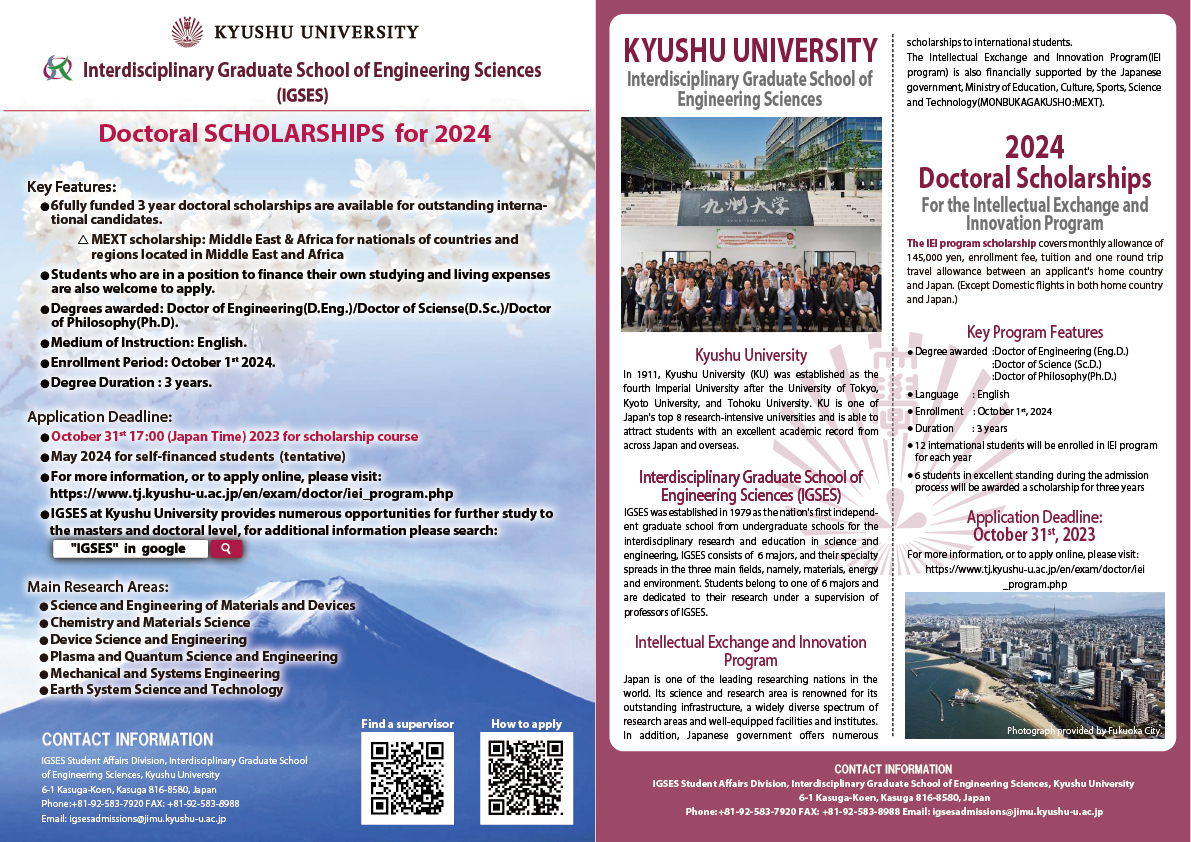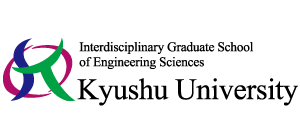Intellectual Exchange and Innovation Program
✔How to Apply
Now closed.
"2024 Guidelines for Application Submissions to the IEI Program with the MEXT scholarship: Middle East & Africa (category D-a) "
[Updated on July 7, 2023]
Now recruting
"2024 Guidelines for Application Submissions to the IEI Program for Self-Financed applicants (category D-b) "
※A list of "laboratories accepting students" can be found in the Application Guidelines.
[Updated on March 23, 2024]
To submit the application documents, applicants MUST carefully refer to the above guidelines.
✔Required documents
| #1 | Application form (Form D-1, 7 pages for category D-a) (Form D-1, 6 pages for Category D-b (Self Financed)) |
| #2 | Research proposal |
| #3 | Abstract of your master's thesis |
| #4 |
Your academic transcripts for both master and bachelor degrees which quantitatively indicate your academic performance evaluation (e.g.; grade point average, GPA). Your certificates which indicate the completion of your undergraduate and graduate study as well. |
| #5 | Your English test/exam certificate ※Only D-a (Mext scholarship program) applicants are required. |
| #6 | A copy of your passport (photograph and information page) |
| #7 | An invitation letter from an IGSES faculty member |
| #8 | Referee report by two academic referees (Form D-8 for category D-a ) (Form D-8 for Self-Financed) |
| #9 | Proof of payment of admission fee (30,000 JPY) ※Only D-b (Self-Financed) applicants are required.(Form D-9 for self-Financed) |
All documents submitted in a language other than English must be supplemented with officially translated and certified copies in the English language.
✔Program Outline
Degree awarded:
▶ Doctor of Engineering(Eng.D.)
▶ Doctor of Science(Sc.D.)
▶ Doctor of Philosophy(Ph.D.)
・Duration: 3 years
・Enrollment: October 1st.
・Course taught in English
Total 6 students who are evaluated as particularly gifted during the admissions process will be awarded a scholarship of 145,000 JPY per month for three years, which is enough to cover their primary living expenses . <[Information of MEXT scholarship is also available here]>
✔Important dates for 2024 admission
Summary and schedule of application per category of screening for the IEI Program
| D-a (Now closed) | D-b Now Recruiting | |
| Classification | Applicants applying for the MEXT scholarship: Middle East & Africa | Self-financed applicants |
| To Do BEFORE submission |
Contact a potential supervisor from the list | Contact a potential supervisor from the list |
| Online Submission starts | October 2, 2023 |
N/A |
| Deadline of application submission | October 31, 2023 at 5:00pm (Japan time) |
May 8, 2024 |
| Screening | After submitting the application documents, applicants will be required to participate in multiple online interviews by the end of October,2023. | An online interview etc. will be held for appropriate applicants after submission of an application. The detail will be announced by each department. |
| Notification of the result of screening | Early January, 2024. |
June 24, 2024 |
| Admission to graduate school | No payment of application fee | Applicants MUST pay an application fee of 30,000 JPY. |
| Registration | No payment of enrollment fee | Applicants MUST pay an enrollment fee of 282,000 JPY. Students may be allowed to postpone the payment of the enrollment fee by submitting a petition of extension. |
| Enrollment | Oct-1, 2024 | Oct-1, 2024 |
✔Program Details
Concepts
Primarily this doctoral program has been conceived to provide a high-tech training academy for talented young people to become the future distinguished academics of Asia, the Middle East, and North Africa. Such individuals, it is hoped will retain deep, meaningful and long term connections with Japan. Due to the potential economic dividend as well as political and moral considerations, the focus will be upon the development of environmentally friendly, green technologies.
As a consequence of being a relatively small and mountainous island nation, Japan has few easily accessible natural resources which can be used as fuels or raw materials for advanced technological processes. Despite these formidable natural obstacles, by the end of the 20th century Japan could count itself as being a member of the pre-eminent, democratic developed nations. From the 1960s onwards, Japan had perfected its own innovative style of management, production and technological innovation. Due to the remarkable success of Japan's key industries, the accumulated knowledge and experience as well as the tools to overcome the environmental consequences of industrialization have since been exported around the globe. It is thus crucial as we move into the 21st century that Japan remains an active and vigorous participant in the global community, especially due to its geographical proximity, and the wider Asian region.

Complacency is often the enemy of success and we can expect as the 21st century matures that the global economy and therefore the highest levels of scientific innovations will originate from large states or federations with sizable populations and abundant resources, such as the United States, the European Union, China and Brazil. In such a climate of competition it is essential therefore that smaller nations such as Japan should actively engage in scientific collaborations, cultural exchanges and the building of bridges to friends and neighbors throughout Asia and the wider global community.
By the name of this “Intellectual Exchange and Innovation Program,” we hope to convey the core ideals and sentiments which will render such a collaboration a success. The young pioneers who enter this program from the targeted regions, we hope will acquire the key knowledge that is necessary to enhance the development of their own nations, while at the same time developing close relationships with academic staff and students of Kyushu University.
Program features
In recent times, most scientific endeavors wherever they may be occurring in the world are conducted primarily in the English language. Indeed all the major journals and those with the highest impact factors are written in English as in fact are all Japanese scientific publications. It could be said that scientific innovation is unlinked with culture, unlike literature, therefore the use of a common language is essential. Japanese institutions have for too long been allowed to lag behind their competitors with respect to the implementation of English to study science.
Recently at Kyushu University we have strived to create an environment where young domestic and overseas researchers can work together effectively, and efficiently, and obtain results by embracing this ideal. Consequently the targeted exceptional international students can feel assured that they will be able to conduct green technology research to the highest levels, without the troublesome restrictions of a language barrier. For all these reasons the medium of instruction of this course will be English only. As this course is a research-based doctoral program. All students will be required to complete several modules in addition to their ongoing doctoral research. They will also acquire knowledge of Japanese culture, society and industry through a series of key lectures and internships.
Excellence linked Scholarships for Promising International Students(※ For category D-a only)
▶Students who are evaluated as particularly gifted during the admissions
process will be awarded a scholarship of 145,000 JPY per month for three years,
which is enough to cover their primary living expenses.
▶Travel expenses from his/her mother country to Japan for the enrollment
and return travel expenses from Japan to his/her mother country after
the completion of the Ph.D. study of three years will be provided.
▶Tuition fees of students awarded this scholarship will be paid by Kyushu University,
thus, the students do NOT need to pay tuition fee, enrollment, and administration fee.
▶ Category D-a (MEXT scholarship: Middle East & Africa) gives preference to applicants who are nationals of countries and regions located in the Middle East and Africa.
✔Entry Requirements
Entry Requirements for the enrollment in Oct, 2024
1) Applicants must hold a master’s degree (or equivalent) from a university, or be expecting to receive a master’s degree by September 30, 2024.
2) Applicants must be physically and mentally capable of pursuing studies at a university.
Applicants who are unsure of their eligibility MUST contact the IGSES Student
Affairs Division as soon as possible at: igsesadmissions@jimu.kyushu-u.ac.jp
Additional Requirements for Category D-a (MEXT Scholarship: Middle East & Africa) Applicants
Nationals of countries and regions located in the Middle East and Africa are given priority in selection.
1) Applicants must be nationals of countries that have diplomatic relations with Japan. In certain cases, this requirement can also apply to stateless persons.
2) Applicants must be under 35 years old as of April 1, 2024 (i.e., born after April 2, 1989).
3) The grade point average (GPA) for both undergraduates and graduates must be at least 3.0 on a 4.0 scale or at least 2.3 on a 3.0 scale.
4) IELTS, CEFR (Common European Framework of Reference for Languages: Learning, teaching, assessment), or Cambridge Certificate score (a photocopy of the scores obtained must be attached). A minimum score is equivalent to B2 of CEFR. The score must be acquired within 2 years. The score acquired before January 2022 will be considered as invalid.
5) Military personnel and civilian employees who remain on active duty may not apply.
6) Applicants who have received a MEXT scholarship within the past three years are ineligible to apply.
7) Applicants who will receive financial support from their government or other organisations are ineligible to apply.
8) Applicants who wish to conduct fieldwork overseas (in countries other than Japan) are ineligible to apply.
9) Successful applicants (i.e. those who have passed the examination and have been accepted into the course) must arrive in Fukuoka, Japan, before September 30, 2024.
